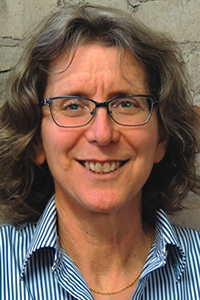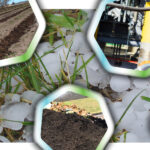
Nora Goldstein
BioCycle November/December 2019
When The JG Press, Inc. took ownership of Compost Science in 1978, Jerry Goldstein — who started the publication in 1960 while editor of Organic Gardening and Farming magazine — modified the name to Compost Science/Land Utilization (CSLU). Jerry noted CSLU was a transitional name, until we found something that truly represented what the magazine had become, and would further evolve into going forward. In 1981, Ina Pincus, Jerry’s wife and cofounder of The JG Press, thought up BioCycle, a name truly representative of our mission.
Wrote Jerry in the January/February 1981 Editorial, where BioCycle® was unveiled: “Coming up with a new name after 20 years, however, is not a simple matter — at least, it wasn’t simple for us. For reasons you can appreciate, we were determined to find a one-word title. The name BioCycle fits well. Our unifying theme is biomass recycling …. and biological waste management. It’s a new word, but we see no problem with that. We have entered a new era and the old ways and attitudes of dumping and incinerating are patently unfeasible and unacceptable.”
Almost 40 years later, the name BioCycle has come to represent much more than a magazine. We have seen numerous uses and adaptations of our name (despite our trademark), as in “to BioCycle”: Capturing organics from the waste stream, processing them, and returning the finished product to the soil, where “the cycle” begins again. In the vernacular of 2019, BioCycle is in essence, a circular economy.
A key part of our BioCycle is the community that Jerry created in 1960, one reader at a time. Sixty years later, through hundreds and hundreds of editions, and at least 150 Conferences, the BioCycle community has grown into thousands and thousands of individuals around the globe dedicated to capturing and processing organics into high value products that create healthy soils, conserve water, control plant diseases and generate renewable energy from biogas. Most importantly, and probably the least recognized by climate policymakers, is that the process and the products of organics recycling are essential tools to reduce emissions of destructive greenhouse gases, mitigate the impacts of climate change, and sequester carbon.
Time is of the essence when it comes to climate change, and we need to act quickly and globally to deploy every proven and available tool in the battle. Team BioCycle decided that publishing a print magazine 8 times a year just won’t do given the urgency to communicate the myriad of benefits and assets that organics recycling brings to winning this battle. We also recognize that now, more than ever, we need to CONNECT as directly as possible to our BioCycle community to share knowledge, lessons learned, tips, data, important news, and more.
Thus, it is with great excitement that we introduce BioCycle CONNECT®, a free e-issue that will arrive in your email Inbox 48 times in 2020, starting on January 8. BioCycle CONNECT will provide the same premier content on best-in-class organics recycling programs, practices and products in a new digital format. The e-issue links directly to BioCycle.net, where users experience the same in-depth content that has been available for 60 years in print.
To build the resilient food systems and communities that will prosper in the face of a changing climate, the world needs “to BioCycle.” And at BioCycle HQ, we’re getting ready. Take a minute to sign up today for BioCycle CONNECT. The new BioCycle for the new decade.










